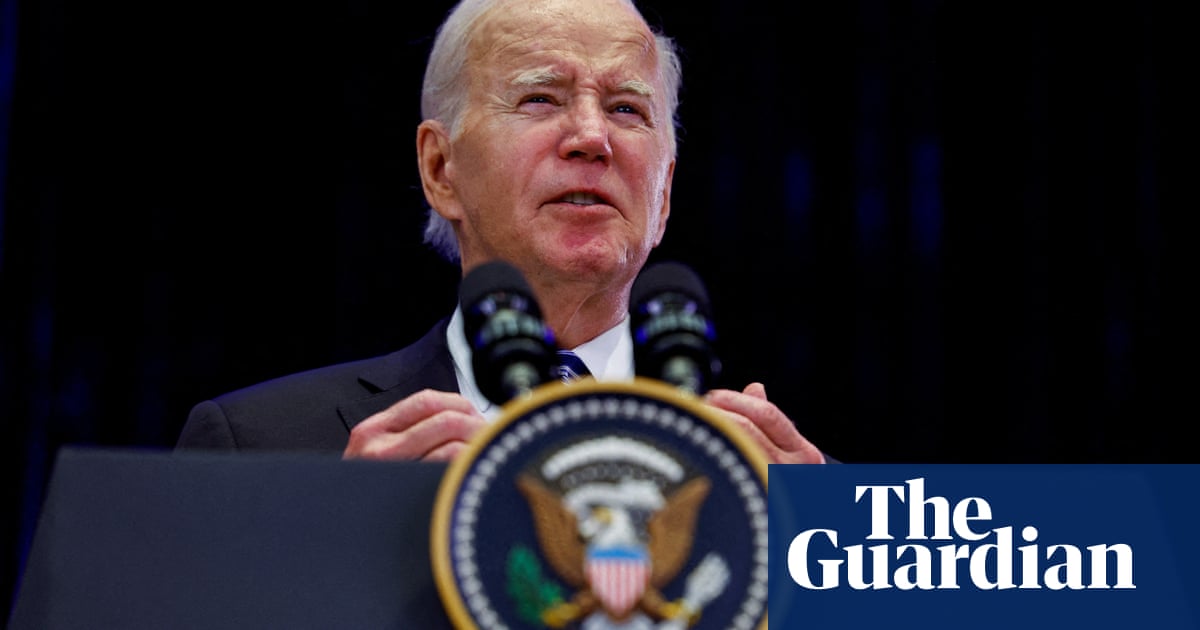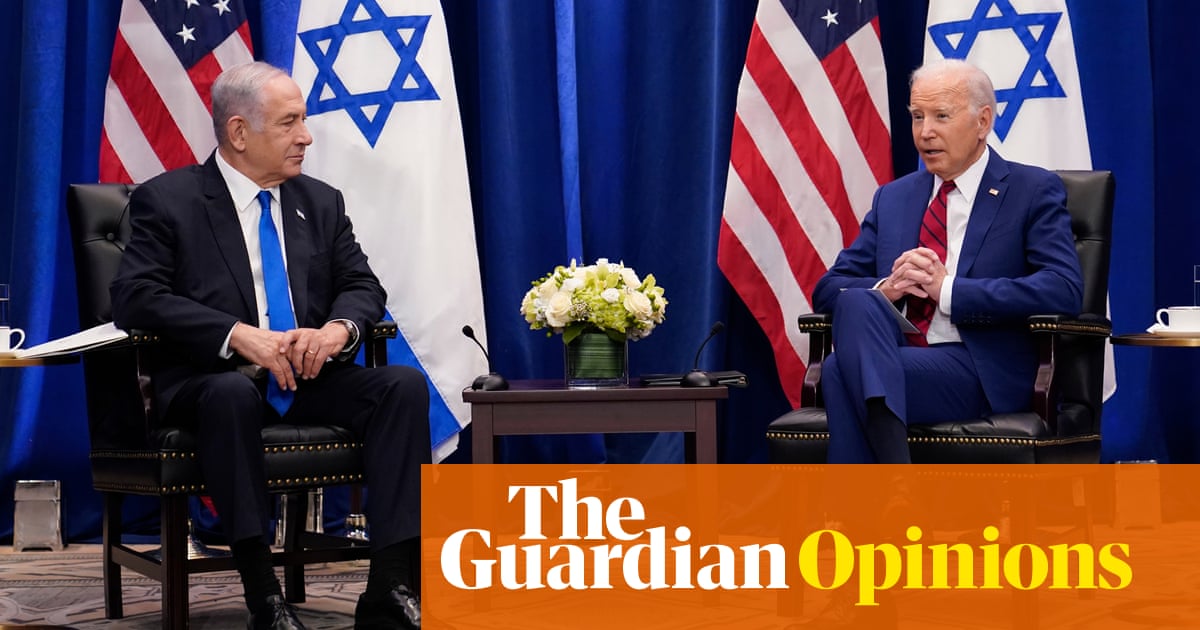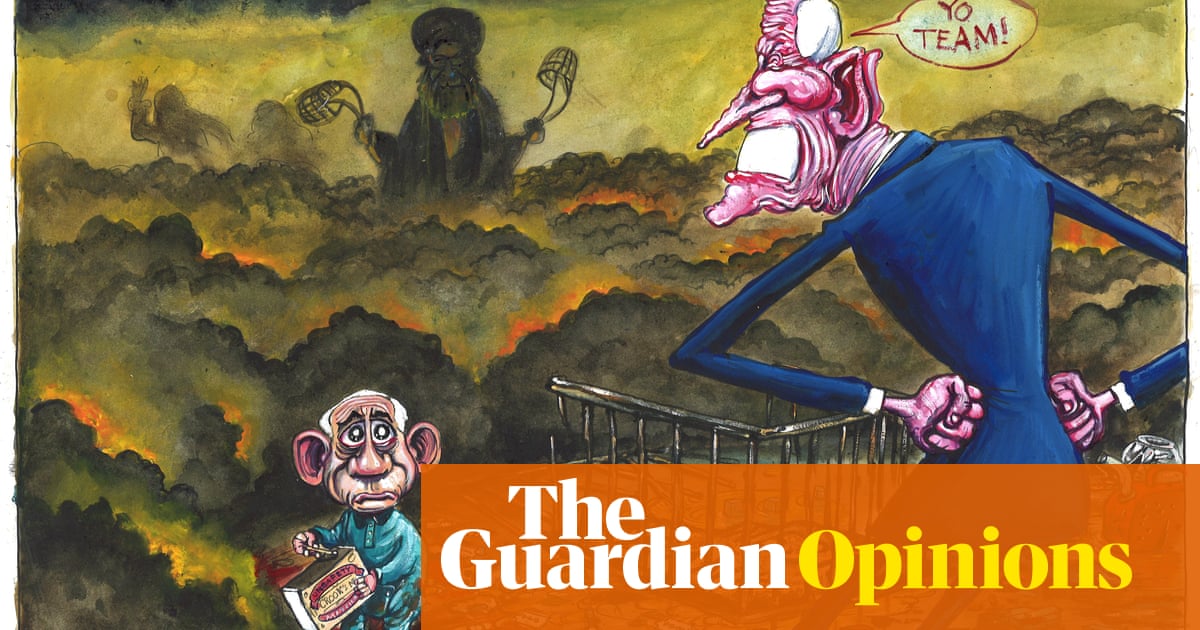
When Joe Biden, the US president, spoke to Israelis during his brief visit this week, he said he and “many Americans” understood “their shock, pain and rage”.
Then he added a warning. “Justice must be done. But I caution this – while you feel that rage, don’t be consumed by it. After 9/11, we were enraged in the United States. While we sought justice and got justice, we also made mistakes.”
The president might have felt that pointing to the US’s own failings, as well as its successes, could have a greater impact on Israelis, after the attacks launched by Hamas from Gaza that killed 1,400 people, rather than efforts to offer lessons in other, less empathic, ways.
He may also have hoped such comments on Wednesday would encourage Benjamin Netanyahu and his hardline rightwing government to moderate a response that has so far led to more than 3,000 deaths in Gaza and which promises many more in a conflict that will probably be grim and gruelling.
“Biden has been on a journey. He voted for the Iraq war in 2003 but under [Barack] Obama was one of the most cautious of the inner circle. He was only one who was against the raid that killed Osama bin Laden. He thought it too risky. He’s become a bit of a sceptic on foreign interventions and that’s based on his impression that the war on terror was by and large a mistake,” said Peter Neumann, professor of security studies at King’s College London.
Quite which of the many errors made by US policymakers after al-Qaida attacked New York and Washington, Biden was thinking of is unclear, but many might now act as warnings for Israeli policymakers.
One is the failure of focus that dogged the US response to 9/11. George Bush as US president not only opted for a massive but largely conventional military response to a threat posed by a small and non-conventional foe, but broadened the effort into an indiscriminate “war on terror”. This might have fulfilled the emotional need of its population for reassurance, retribution and the “justice” Biden spoke of in Israel, but it committed the US to an unending and eventually exhausting battle against an ill-defined enemy.
Netanyahu has told Israelis: “We will wipe this thing called Hamas, Isis-Gaza, off the face of the earth. It will cease to exist.” Tactical similarities exist between the atrocities perpetrated by Hamas and those of Islamic State but there are no organisational links between two very different groups.
Yossi Melman, the veteran intelligence reporter for Haaretz, told the Washington Post: “What does it mean to crush Hamas? Hamas is an ideology, like [IS]. It’s difficult to crush an idea.”
Netanyahu was probably citing IS as a rhetorical device. But with no strategic plan outlined by any Israeli official for a military victory there is a danger the campaign broadens as the conflict goes on. Keeping all Israelis safe all of the time is impossible, even if the deterrent effect that is at the heart of Israeli security doctrine can be restored, however bloodily. Thus Biden’s warning.
Then there have been the conscious decisions taken by US policymakers to ignore the basic recognised ethical, law and even professional practices of war.
This outlook permitted the human rights abuses associated with Guantánamo Bay, CIA renditions, and torture. Instead of “moral clarity” this dragged the US into a world of cynical violence and illegality that appalled supporters and, especially as sweeping security measures were introduced, was demoralising at home.
It was also often counterproductive, leading to greater numbers of extremist recruits. Al-Qaida and other groups are already exploiting images of suffering in Gaza.
Biden could also be warning Israel not to misjudge its own capabilities. The ambitions of the war on terror overwhelmed realistic appraisals of resources available even to the US. There was the poorly considered and resourced nation-building effort in Afghanistan and the biggest single blunder of all: the invasion of Iraq. Supporters in Washington believed they could remake the Middle East. Instead the unnecessary intervention had devastating consequences for regional and global security.
One particularly problematic thought is that in the immediate aftermath of the 9/11 attacks, Syria and Iran sought better relations with the US, offering desperately needed intelligence on al-Qaida or even captive senior militants as a token of good will. Both were rebuffed, with Iran included alongside Iraq and North Korea in the “axis of evil” described by Bush in his 2002 State of the Union address.
Now Syria and Iran are bitter enemies of both the US and Israel, and could play deciding roles in the current unfolding crisis. If Tehran launches Hezbollah in a full-scale attack across the border from its strongholds in southern Lebanon or through the Golan heights, Israel will find itself caught in a two-front war. This might well pose an existential threat, forcing the US to intervene in a new and very direct way.
Perhaps what was uppermost in Biden’s mind was how the vast outpouring of sympathy for the US in the immediate aftermath of the 9/11 attacks turned to concern, frustration and then often deep anger.
“Americans overestimated how much the hurt and anger that the US was experiencing was what the world was experiencing … A lot of people in the world, including allies, don’t see it the way the Israelis do and won’t support them all the way. The dynamics have changed for Israel but not for the rest of the world. That’s a lesson the US learned the hard way, and Israel is at risk of falling into the same trap,” said Neumann.
Biden might remember how, when Obama made his speech in Cairo in 2009 after eight years of the war on terror, seeking “a new beginning” in relations with the Islamic world, it was far too late. A wave of polarisation and radicalisation had swept across much of the world.
“The vast majority of Palestinians are not Hamas … Hamas does not represent the Palestinian people,” Biden told Israelis. A few hours later, he was on his way back to Washington.












